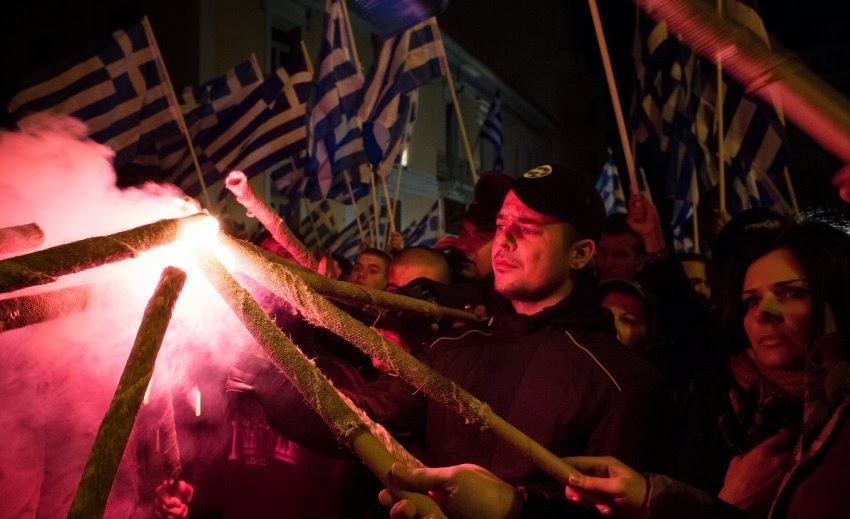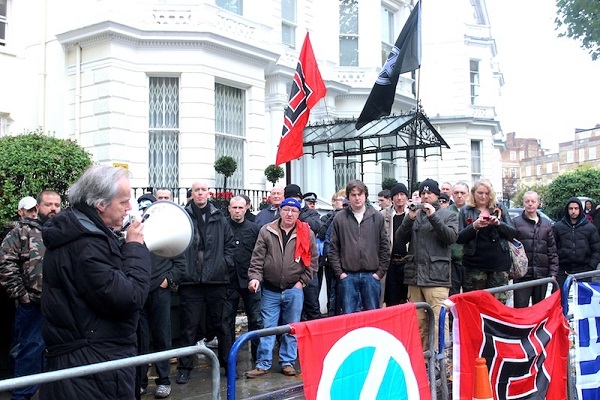Max Musson
Western Spring
November 20, 2013

On 18th September this year, an ‘antifascist’ rapper, Pavlos Fyssas, otherwise known as ‘Killah P’, and hitherto virtually unknown outside of Greece, was stabbed to death in a brawl outside a café in Keratsini, allegedly by a supporter of the Greek nationalist ‘Golden Dawn’ party.
Since then, police raided the headquarters of Golden Dawn, arresting a suspect, believed to be George Roupakias who worked in the cafeteria which serviced the Golden Dawn offices, and the police have also carried out a wave of arrests of senior Golden Dawn figures, including party leader Nikolaos Mihaloliakos. He and five other Golden Dawn officials have been charged with belonging to a ‘criminal group’.
Following these arrests, we published evidence indicating that Greek police were under pressure from Greek’s Jewish community to outlaw Golden Dawn and it is believed that the murder of Fyssas’ was used as a convenient pretext for repressive action.
Prior to these Fyssos’ murder and the subsequent wave of arrests, Golden Dawn’s popularity was such that they had established themselves as the third most popular political party in Greece. Golden Dawn, had 18 MPs in Greece’s 300-seat parliament, was receiving support from c.15% of the electorate in polls and was the country’s fastest-growing political party.
In the wake of the arrests with allegations in the press and by their political opponents that the party was officially involved in the Fyssas’ murder, Golden Dawn’s popularity in opinion polls dropped significantly, but more recent events have seen their former popularity restored.
On 1st November, two men mounted on a motorcycle drew up outside the headquarters of the party in Neo Irakleio, a northern suburb of Athens. The pillion passenger dismounted and as he approached the building, gunned down three Golden Dawn members standing outside, killing two, Giorgos Fountoulis and Manos Kapelonis, and seriously wounding a third, Alexandros Gerontas.
In all, twelve bullets were found at the scene, which ballistics experts believe were fired from a Serbian-made 9mm Zastava handgun.
A previously unknown Greek anti-establishment group, the Militant People’s Revolutionary Forces, has claimed responsibility for a drive-by shooting, claiming the attack had been carried out in retaliation for the fatal stabbing of Pavlos Fyssas.
The police have not confirmed the authenticity of these claims, which came on the eve of rallies to commemorate the 40th anniversary of a bloody student uprising against the military junta that ruled Greece at the time.
“The brazen murder of Pavlos Fissas was the drop of blood that made the glass overflow,” the group wrote in an 18-page letter filled with anti-establishment invective. It called the rapper’s killing a turning point.
“The armed attack-response … is the starting point of the people’s campaign to send the neo-Nazi scum of Golden Dawn where they belong, to the dustbin of history,” it said.
Meanwhile, outrage has been voiced by politicians across the spectrum amid concerns that the attack, which lasted 10 seconds and was captured on CCTV, will intensify what has been likened to a civil war between radical factions on the left and right.
Parties that only weeks ago were deploring the neo-fascist Golden Dawn have called it an “assault on democracy”.
Golden Dawn claim that police protection of their headquarters building have been withdrawn just two weeks before the attack occurred and the incident has resulted in a surge in support from the party which has shown support from in excess of 20% of the electorate in some opinion polls.
Last Saturday, there was a demonstration outside the Greek embassy in London by 35 British supporters of Golden Dawn, concerned about the apparent political repression of the party on the fairly flimsy pretext that the murder of Pavlos Fyssas was in some way sanctioned by the party leadership.

A spokesperson for ‘New Dawn’ a group claiming to have organized the demonstration said of Pavlos Fyssas’ murder, “First of all, any murder is regrettable, but everything must be put into perspective. The individual who was killed was a supporter of violent antifa groups – he was an anarchist who sang songs in which he called for nationalists to be murdered. From what I have heard, the situation in which he was killed was a clash between two groups of football hooligans in the bar, so it’s not as if he was an innocent bystander.
“There have been a number of incidents in the past several years where nationalists have been murdered by antifa and the system hasn’t reacted to it by arresting a member of a left wing party and raiding their houses.”
Going on to comment about the more recent shooting of Golden Dawn members he said, “The media distorts everything because it is controlled by special interest groups who are unanimously hostile to us nationalists. The murders themselves received little or no coverage by the mass media, whereas the death of the antifascist made headlines.
“What happened to Manolis Kapelonis and Giorgos Fountoulis was a clear case of a cold-blooded assassination that was condoned, if not indeed ordered by the political establishment empowered in Greece. I don’t think it was by normal antifascists – it was too professional.”
When asked about New Dawn, the spokesperson went on, “The New Dawn is an ideological movement in an embryonic state at the moment and is being formed by some of us who have been involved in British nationalism to counter the present state of fragmentation, in-fighting and general confusion that exists within the movement.
“The decision was made after some consideration that we should put together a group with a hardcore ideological wing on the one hand and street presence on the other.
“We hope to attract people who don’t see the established groups normally associated with the far-right moving forward. Potentially, we could get a lot of support, especially considering the current situation in other movements. The BNP, for example, has lost most of its membership, while the EDL has experienced in-fighting after leading members recently dropped out.”
